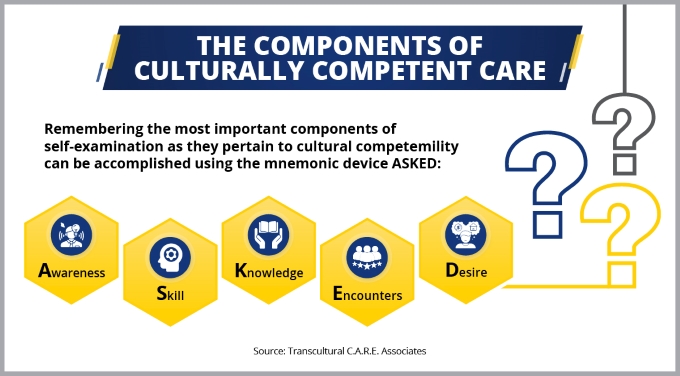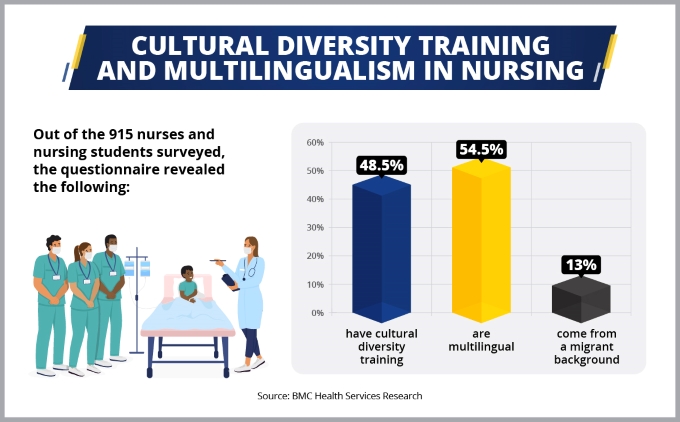Cultural Competence in Nursing

Imagine a situation in which a healthcare provider and a patient encounter a cultural barrier that compromises treatment. For example, a patient involved in a car wreck might require a blood transfusion; however, the patient refuses it due to their religious beliefs. The healthcare provider must quickly devise an alternative treatment as valuable seconds tick by. In many healthcare facilities, this challenging scenario is a reality.
Healthcare workers treat a broad range of patients from different backgrounds, family dynamics, and cultures. Considering that the United States is one of the most diverse nations in the world, patient care cannot be one-size-fits-all: It must be tailored to each individual and their unique cultural background.
Cultural competence in nursing is a concept with many interpretations that remain in flux as healthcare systems and cultural sensitivity evolve. However, the prevailing definition is healthcare workers’ ability to respect, understand, and interact with people from different cultures and backgrounds.
Cultural competence enables healthcare workers to communicate and deliver care that is modified to suit patients’ needs, values, and beliefs. Ultimately, this results in patients feeling valued and promotes higher levels of patient satisfaction and better healthcare outcomes among diverse populations.
Increasing awareness of the importance of cultural competence in nursing and implementing cultural competence among nursing students, active registered nurses (RNs), advanced practice nurses (APRNs), and nurse leaders remain challenges that must be met to advance healthcare, promote health equity, and improve patient outcomes.
What is cultural competence in nursing?
As the country becomes more diverse and the individual needs of patients evolve, government healthcare agencies such as the U.S. Department of Health and Human Services (HHS) are promoting the importance of culturally competent care in nursing.
In a broad sense, cultural competence in nursing is what allows a nurse to meaningfully interact with people with different cultures or belief systems. Furthermore, it means that nurses appreciate and respect all cultural backgrounds when treating patients.
However, the definition of cultural competence varies depending on the organization weighing in on the subject. For example, the Centers for Disease Control and Prevention (CDC) breaks down cultural competence into a series of eight principles:
- Broadly defining culture
- Valuing the cultural beliefs of patients
- Recognizing the complex nature of interpreting foreign languages
- Facilitating the cultural learning process between healthcare providers and the communities they serve
- Involving the community when defining and addressing the medical needs of patients from different cultures
- Collaborating with other healthcare agencies and organizations to develop cultural competence
- Hiring and training healthcare staff members who are willing to embrace cultural competence in nursing
- Institutionalizing cultural competence
Additionally, the CDC states that healthcare organizations must satisfy certain requirements to be considered culturally competent, including the following:
- Having a clearly defined set of principles and values that demonstrate cultural awareness and sensitivity
- Establishing policies and structures that enable healthcare workers to be effective when delivering cross-cultural care
- Possessing the capacity to self-assess cultural competence, value diversity, learn about different cultures, manage the dynamics between different cultures, and adapt to patients in a cross-cultural setting
- Incorporating the knowledge and values of different cultures into training, policymaking, patient care, administration, and other relevant aspects of healthcare
Healthcare challenges of culturally diverse populations
Historically, people from different cultures have been marginalized, oppressed, or subject to bias, resulting in healthcare inequities and uneven access to professional medical care. Promoting cultural competence in nursing can help healthcare workers overcome cultural barriers and social stigmas. The most common healthcare challenges in treating culturally diverse populations include the following:
- Lack of awareness of the importance of cultural competence in nursing
- Miscommunication with other providers and patients due to cultural differences
- Lack of understanding or availability of services that respect diverse religious or cultural backgrounds
- Too few nurses on staff from different cultural backgrounds or underserved communities

What are the components of culturally competent care?
Culturally competent care in nursing is a combination of cultural competence and cultural humility. The latter concept refers to a nurse’s intent, meaning that they enter the nurse-patient relationship actively honoring the patient’s values, customs, and beliefs. Combining cultural knowledge and cultural humility results in what is known as competemility: the synergistic process between cultural competence and cultural humility
According to the American Nurses Association (ANA), the five main components of cultural competency that cultural humility permeates are as follows:
- Cultural awareness
- Cultural skills
- Cultural knowledge
- Cultural encounters
- Cultural desire
Cultural awareness
Healthcare workers who are culturally aware are conscious of their own biases, prejudices, and phobias relevant to other cultures.
Cultural skills
Healthcare workers who possess cultural skills can deliver patient care in a culturally sensitive manner that respects the values and beliefs of the patient.
Cultural knowledge
Healthcare workers who consciously acquire information about the beliefs, values, and backgrounds of culturally diverse patients develop cultural knowledge.
Cultural encounters
A cultural encounter is characterized by the demonstration of healthcare providers’ cultural awareness, skills, knowledge, and desire to a patient from a different culture.
Cultural desire
Healthcare workers who are open-minded and motivated to learn about different cultures demonstrate cultural desire.

Importance of cultural competence in nursing
Cultural competence is relevant in almost all aspects of nursing care. Nurses treat culturally diverse populations, and it’s integral that each patient receives the care and support that aligns with their beliefs and values. Understanding how to provide culturally competent care can increase health equity and overall quality of care by considering the intersecting aspects of each patient’s individual identity and how they might affect their attitudes and choices regarding healthcare. This can help nurses establish trust with their patients and their families, effectively advocate for their patients, and develop culturally sensitive and appropriate care solutions.
There are many ways to practice and prioritize cultural competence in nursing, and its benefits are both tangible and far-reaching. Below are just some of the benefits that exemplify the importance of cultural competence in nursing.
Improved patient care and outcomes
Healthcare providers who practice cultural competence in nursing make their patients feel welcome, are better equipped to communicate with patients, and can deliver a more personalized version of patient care that respects cultural and religious differences — all of which produce better outcomes overall.
Decreased risk of healthcare disparities
Healthcare disparities between different groups occur for many reasons, including poverty, a lack of access to healthcare, and other barriers to care. Culturally competent nurses turn a common healthcare barrier into an opportunity to treat populations that may be subject to health inequities or unfair treatment.
Deeper patient relationships
Culturally diverse patients who feel understood, valued, and respected have meaningful interactions and bonding with their healthcare providers.
Greater patient satisfaction
Cultural competence in nursing ensures that culturally diverse populations can receive the care they need from healthcare professionals who value them, respect their cultural boundaries, and take the time to form meaningful connections. Culturally competent nurses also provide a more personalized variety of patient care that is less prone to errors or cultural faux pas, resulting in greater patient satisfaction.
8 Examples of cultural competence in nursing
Several avenues to promoting cultural competence in nursing exist, many of which occur at the provider level. To see how healthcare providers can amend their behavior, consider the cultural competence in nursing examples below.
1. Identifying patients from diverse and underserved communities
Healthcare providers can proactively determine what cultures they should familiarize themselves with by reaching out to communities from different backgrounds and those who are experiencing health disparities. For example, a nurse might reach out to their local social work organization to learn more about families or demographics within the local community that have encountered difficulties receiving healthcare services.
2. Building rapport and trust with patients
Creating a bond with patients is an essential soft skill in nursing that demonstrates healthcare providers have their best interests at heart. This bond is especially important when working with culturally diverse populations. Nurses working with patients from other cultures should find a way to open the lines of communication and find common ground. Building rapport and trust by sharing a personal experience can help put the patient at ease.
3. Using language that patients understand and overcoming language barriers
Communication is a key element in culturally competent care in nursing; however, language barriers are a common hurdle that nursing staff must overcome. Nurses should always use the patient’s native language whenever possible. If the nurse does not speak another language, they should enlist the help of a fellow nurse who can communicate with the patient or someone who can translate. Additionally, avoiding complicated medical jargon is a good best practice that ensures that patients do not misunderstand their treatment options. Even with native English speakers, nurses should use terminology that is easy to comprehend.
4. Demonstrating a genuine interest in learning about other cultures
By vocation, nurses are lifelong learners who must remain current on patient care best practices and clinical advancements. Exceptional nurses who are committed to providing the highest level of care possible take the time to learn about the community they serve, including culturally diverse populations. Demonstrating a genuine interest in learning about other cultures shows patients that their healthcare provider is invested in creating a meaningful relationship with them.
5. Having a medical interpreter present
Having a medical interpreter present is a cornerstone of cultural competence in nursing and saves valuable time. By enlisting the services of medical interpreters, nurses can quickly retrieve valuable information about what a patient is experiencing, their symptoms, current medications, and more. Medical interpreters demonstrate to patients from culturally diverse backgrounds that their healthcare providers have thought ahead and considered their unique communication needs.
6. Respecting religious and cultural beliefs, including end-of-life care traditions
Patients from all cultural backgrounds and faiths deserve to have their beliefs and end-of-life traditions respected, even if they directly conflict with those of the healthcare provider. To prepare, nurses should learn how to provide culturally competent care to patients from different religions and cultural backgrounds. Nurses can reach out to clergy to learn about how to deliver patient care in a respectful manner to those who have different religious and cultural beliefs.
7. Recruiting healthcare professionals from diverse and underserved communities
Having healthcare professionals on staff from different cultural backgrounds ensures that a hospital or healthcare facility is prepared to serve a culturally diverse population. This also decreases reliance on medical translators and family members to overcome language barriers.
8. Forming committees that promote cultural competence in nursing
Forming a committee that prioritizes how to provide culturally competent care demonstrates a facility’s commitment to addressing health disparities and serving a multicultural population. By building relationships with local community leaders and organizations that raise awareness of other cultures, healthcare providers can learn cultural competence in nursing and improve care.
Nursing cultural competence skills
Cultural competence in nursing is a combination of hard and soft skills. Some nursing cultural competence is developed through practice and education. Other nursing skills pertain to attitude, mental state, and the ability to be open and flexible.
Ability to remain objective and nonjudgmental
Demonstrating cultural competence in nursing means being able to address and put aside any biases or personal prejudices that can make the patient feel as if they are being judged for their cultural differences or religious beliefs.
Humility
Humility is the ability to remain humble and to view oneself modestly and is an incredibly hard skill to teach. However, to fully demonstrate culturally competent care in nursing, healthcare providers must master the ability to put patients and their religious and cultural beliefs ahead of their own, even when they directly conflict.
Commitment to the lifelong learning process
Nurses never finish learning. That holds true for the clinical aspects of healthcare as well as soft skills, such as learning to treat patients from different cultural backgrounds. Nurses who devote themselves to learning how to provide culturally competent care must commit to immersing themselves in different cultures as part of their lifelong learning process.
Communication proficiency
Communication is vital in healthcare environments. An environment in which patients and nurses can communicate without barriers improves the quality of care provided while ensuring that the patient’s cultural and religious beliefs are respected. Learning a second language is one of the best cultural competence in nursing examples because it demonstrates the healthcare provider’s commitment to the community they serve.
Self-awareness
Nurses demonstrate their awareness of the situation by addressing the medical needs of patients and providing emotional support; however, culturally competent nurses must also possess a sense of self-awareness. By taking the time to self-evaluate, nurses can identify the attitudes, beliefs, or judgments that are creating a barrier between themselves and culturally diverse patients.
7 Tips on how to provide culturally competent care
Cultural competence in nursing has yet to be implemented on a wide scale in formal nursing education programs; this means that healthcare providers must take the initiative to educate themselves. Refer to the tips below on how to provide culturally competent care and develop into a culturally competent nursing professional.
1. Find opportunities to work with local organizations and community leaders
Healthcare providers should research their local community to identify organizations and leaders who represent culturally diverse populations. Participating in volunteer opportunities can create a bond between communities from different cultural backgrounds and their healthcare providers.
2. Open a dialogue with local religious leaders to understand the different faiths in the community
Christianity remains the predominant religious affiliation in the United States, but assuming that patients are Christian can be a major barrier to delivering culturally competent care. Nurses who wish to better serve culturally diverse populations should reach out to clergy to educate themselves about different faiths. Taking the initiative to learn about different religions showcases an open-minded attitude and commitment to patients from different backgrounds.
3. Take continuing care courses for nursing education
Nurses can find continuing education courses pertaining to culturally competent care locally or online. The Health Department provides an online course that is worth nine continuing education credits and is free of charge.
4. Learn the local language
Learning the language of the population that a nurse serves is the best way to maintain open lines of communication and decrease reliance on interpreters. Healthcare providers committed to culturally competent care in nursing can find several local and online courses capable of teaching them a second language. Smartphone apps such as Duolingo and Babbel can help nurses learn while on the go.
5. Learn from co-workers who are experienced in delivering culturally competent care
Nurse educators who are experienced in the field of healthcare develop and train nurses. In addition to clinical skills, experienced nurses are a readily available resource for new nurses who wish to learn about how to provide culturally competent care in nursing.
6. Relate to patients by sharing something about your own culture that’s similar to theirs
Knowing how to build connections with patients is a soft skill that all nurses should master. Sharing something personal or finding mutual ground can fast-track the connection with a patient from a different culture or background. Personal details may be something about the nurse’s family, where they grew up, something they like to do in their free time, or an anecdote about their children or pets.
7. Work on changing your perspective and worldview
Cultural competence in nursing requires open-mindedness and the ability to set aside one’s own cultural perspectives for the sake of others. This is not always easy, but it can be accomplished with practice and a willingness to learn. Healthcare providers who take the time to consider the cultural and religious beliefs of others demonstrate humility to their patients.
Competent care resources
For more information about cultural competence in nursing, look into the following resources:
- Centers for Disease Control and Prevention, Cultural Competence in Health and Human Services: A resource from the CDC that defines cultural competence, outlines the principles of cultural competence, and illustrates how cultural competence applies to HIV/AIDS and other communicable diseases.
- OneStaff Medical, “7 Ways to Become a More Culturally Sensitive Nurse”: A resource for traveling nurses that provides useful tips on overcoming cultural barriers and methods for becoming more culturally sensitive.
- IntelyCare, “Cultural Competence in Healthcare: Definition and Examples”: A resource that defines what cultural competency is in healthcare and why it is important, with examples of how to improve cultural competence in nursing.
- Indeed, Why Cultural Competence Is an Important Quality in Nursing: A resource that defines cultural competence in nursing, provides reasons why it is vital to healthcare, and breaks down its main components.
- U.S. Department of Health and Human Services, National Culturally and Linguistically Appropriate Services Standards: A comprehensive explanation of the Health Department’s national culturally and linguistically appropriate services standards, also known as the National CLAS Standards.
- U.S. Department of Health and Human Services, Health Equity Timeline: A resource that provides the Health Department’s health equity timeline, from 1985 to now.
Be part of a global solution through cultural competence in nursing
The importance of cultural competence in nursing cannot be overstated, especially for those who work in areas with dense and culturally diverse populations. Nursing professionals who learn to administer culturally competent care benefit patients and their healthcare providers by overcoming communication barriers, solidifying bonds of trust, ensuring religious beliefs are respected, and elevating the quality of overall care.
Before becoming culturally competent nurses, healthcare professionals must successfully merge cultural knowledge and cultural humility to achieve competemility. Ultimately, this enables nurses to treat a broader range of patients, resulting in additional opportunities in the field of nursing, including travel nursing and international nursing. Cultural competence in nursing is not just personally rewarding; it can help elevate healthcare providers on their professional path.




